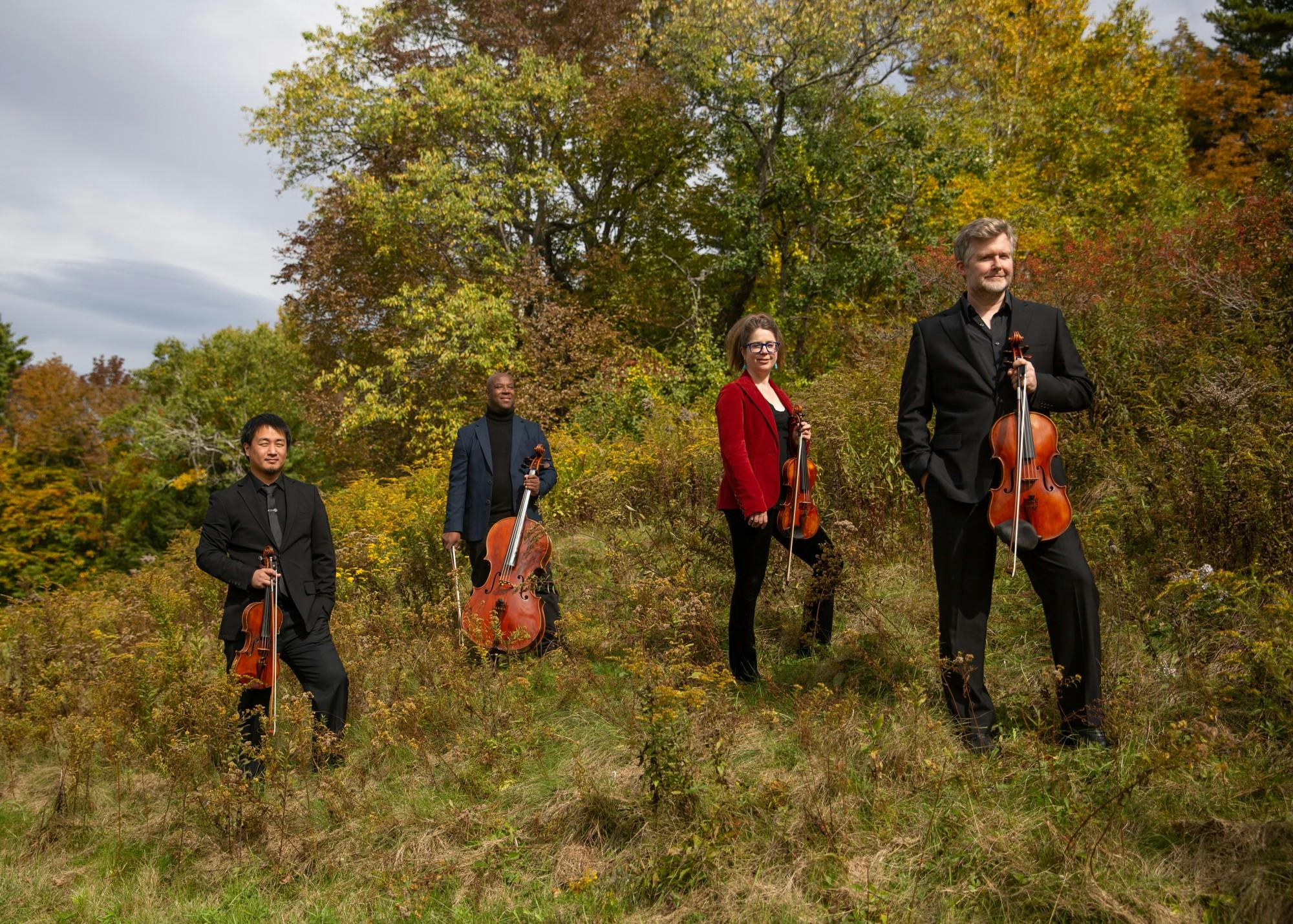On Friday, Jan. 27, the Church of Christ at Dartmouth College opened its doors to students and community members to host the Apple Hill String Quartet in concert, as part of the group’s year-long artistic residency at the Hopkins Center for the Arts. The quartet performed works by both contemporary and classical composers, as well as the premiere of a commission by Dana Lyn in collaboration with the Hood Museum of Art.
During this visit to Hanover, the group has also participated in a reading session with Music Department courses MUS 22, “Harmony and Rhythm” and MUS 23, “Timbre and Form.” The quartet also sat on a Hop panel with Lyn, which discussed opportunities for aspiring artists in the 21st century.
The headliner of the concert was the commissioned piece by Lyn, titled “The Ceremony That Never Was.” The piece guided the audience through the experience of a series of paintings of the same name, currently in the Hood’s collection, by Wiyot painter Rick Bartow.
Lyn said that in the process of creating her composition, she spent time with the paintings — albeit digitally — and researched more into Bartow’s life. While reflecting on his works, she said she found that he too was a musician.
“It was all very dreamlike, and he had had a lifelong search for identity, and in his work there is a lot of food for thought,” Lyn said.
Lyn shared that she began to develop a backstory for the painting series then drew inspiration for her composition from that storyline that came to her.
Lyn takes the audience through the narrative she had created with Bartow’s inspiration, often using the different voices of the string quartet to create characters from the story. Lyn’s background as a string performer shined through in these moments where the instruments became characters.
Concert attendee and MUS 23 student Mateo Oyola ’24 said the narrative and the extended techniques in the pieces were compelling.
“The composition was absolutely evocative. It developed into this motif which wrapped [the audience] up into a story,” Oyola said. “Partly because of what we learned in [MUS 23], I was able to pick up on some of the more extended techniques in the commissioned piece.”
These techniques were well suited for the characters that Lyn and Bartow had created together, Oyola added. The piece as a whole bridged the worlds of visual and performing arts, Oyola said.
The bridge between these worlds is important to Apple Hill String Quartet, and lead violinist Elise Kuder, who said that the quartet was excited to be introduced to such a beautiful composition. Additionally, the reimagination of the work of Bartow, was well suited for the concert premise. According to the Hopkins Center Website, the concert strove to bring Native American art to life.
In addition to the commission, Apple Hill String Quartet also performed a work by Diné-American composer Raven Chacon, who was recently awarded a Pulitzer Prize for music — the first Native American composer to attain this title. The quartet performed his work for a string quartet titled “Double Weaving,” which took the audience on a journey from dusk to the next dawn. In the physical score, which the quartet invited audience members to view at the intermission, Chacon had made frequent use of visual representations of the music to communicate style and form to the performer through drawings and sketches in the score.
Both Chacon’s and Lyn’s pieces made use of imagery stemming from their respective visual inspirations to create characters and communicate storylines. Chacon made use of experimental techniques such as contrasting rhythmic textures to aid the audience in their journey through “Double Weaving.”
By performing works with an emphasis on storytelling and visual imagery, the experiences of both the performer and audience member are elevated, Kuder said. Kuder also highlighted the importance of Apple Hill performing works by historically underrepresented composers and shared her excitement for being able to play a work by Chacon.
“It is a way of our eyes being opened to worlds we would not otherwise know,” Kuder said.
In addition to the pieces by Lyn and Chacon, Apple Hill performed works by Serbian composer Aleksandria Vrebalov and French composer Maurice Ravel.
The piece by Vrebalov, “Pannonia Boundless,” aimed to bring representation to music not traditionally heard in the classical concert hall. Vrebalov’s concept fits Apple Hill String Quartet’s overall mission and theme of this concert. The final piece, Ravel’s “String Quartet in F Major,” is part of the traditional canon and represents the quartet’s desire to perform these pieces alongside the new commissions and contemporary compositions that they also select, according to Kuder.
The Apple Hill String Quartet will be back at Dartmouth in April to perform works by Mexican composers as part of the continuation of its year-long residency.
Ramsey Ash ’24 is a quantitative social science and music double major from Huntington, West Virginia. In addition to writing for the Arts section, Ramsey is involved in The Dartmouth College Wind Ensemble, the Dartmouth Clarinet Choir, is co-president of Musical Empowerment at Dartmouth and is a Hopkins Center Fellow.




